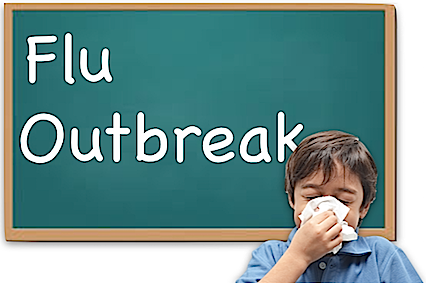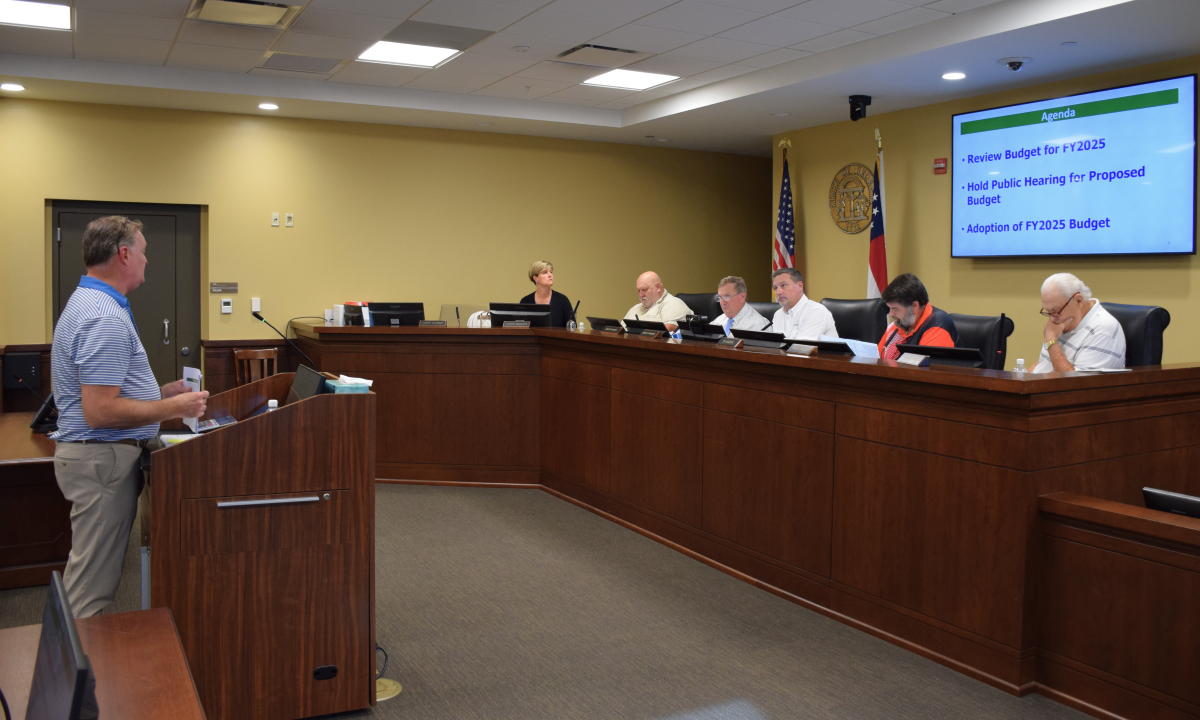
UPDATE: Attendance improves at Cornelia Elementary School. Flu outbreak still a concern. Administrators urge parents to keep sick kids home.
Some positive signs in attendance this morning at Cornelia Elementary School. Only 13% of students are out today, compared to 41% last week. “It appears that our efforts to stop the spread of sickness are paying off,” says Habersham County School Superintendent Matthew Cooper. He says, based on screenings performed by the school, it appears that the students are returning to school well. “They only found four students in the entire school with a fever this morning,” Cooper says. He calls it “tremendous progress.”
The flu outbreak that’s gripping the nation appears to have hit Cornelia Elementary School especially hard. So much so, that parents continue to voice their concerns about keeping schools open in the face of the worst flu outbreak in a decade.
Nationwide, 53 children have died from flu-related illnesses. There’s been one pediatric death recorded so far in Georgia. Those numbers likely will rise as flu season peaks.
READ 51 flu-related deaths in Georgia
Habersham County school officials say they’re taking every precaution to keep students safe.
“On the whole, our school system has fared quite well during a flu season that has hit our nation and state hard,” says Habersham County Superintendent of Schools Matthew Cooper. Currently, he says the only area of real concern is Cornelia Elementary School. Last Thursday absenteeism there reached 40%.

Despite the absences, I think it would be a mistake and disservice to our stakeholders to close our doors at this time simply due to the number of students who are not sick.
There were 268 students absent from Cornelia Elementary School on February 1. Cooper says there’s no way to know for sure how many of those absences were due to the flu. “Every year at this time, we also deal with stomach viruses, common colds, and strep throat,” he explains. Still, school officials suspect the flu is a contributing factor.
School nurses sent home a large number of students from Cornelia Elementary last week as a preventative measure. “Our schools are carefully screening students for fever. We have set a very conservative threshold,” Cooper says. “Students with a fever of 99 degrees or higher are required to go home and recover from whatever illness that they have.”
Keeping schools open. Keeping students safe.
Currently there are no plans to close any public schools in Habersham County. Administrators say they’re committed to keeping schools open as long as it’s safe to do so.
“We realize that closing our doors due to illness would create a hardship for our students and families – especially when we currently have a majority of our students who are healthy and able to attend school,” says Cornelia Elementary School Principal Amy McCurdy. “We love and care about each of our students at Cornelia and we will continue to pray for those who are out sick and unable to attend due to illness. Despite the absences, I think it would be a mistake and disservice to our stakeholders to close our doors at this time simply due to the number of students who are not sick.”
McCurdy says Cornelia Elementary is a taking a “very proactive stance” to fight illness. The school requires hand-washing breaks for all classrooms, disinfects high-traffic areas frequently throughout the school day, and ensures students are fever-free for 24 hours without medication prior to returning to school.
Students are coming to school sick and are spreading it to others.
“We are following the CDC’s guidelines for any confirmed cases of flu that are reported,” McCurdy says. The school system is providing the school with guidance, additional support, and resources. An extra team of custodians is going into the school at night. “This team sanitizes the building from top to bottom,” says Cooper. He says an additional nurse has been assigned to the school until the flu outbreak ends.
Upside?
The upside to this flu season so far is that school staff have remained relatively healthy. As of last Thursday, only one teacher at Cornelia Elementary had a confirmed case of the flu. Cooper says other schools are “doing quite well.”
System-wide, the absentee rate on February 1 reached 11%. On that day, 783 of the district’s 6,923 students were absent. Cooper says normal daily absentee rates – those outside of flu season – range from 5-7%.
“For flu season, having only 11% of our students absent is really quite remarkable and does not constitute reason for concern,” the superintendent says. “Our real concern is continuing to wage war on sickness and to take certain proactive measures in all schools.” Those measures include:
- Launching an aggressive hand washing campaign
- Carefully screening students for fever
- Sanitizing door handles, student desks, water fountains, telephones, and other surfaces
“All custodians have made sanitizing the school their top priority,” Cooper says. The district has purchased a “very large quantity” of hand sanitizer that’s now being used in all schools. And it’s not just for students and staff. Schools are encouraging visitors to wash their hands when they arrive and before they leave.
Keep sick children at home

These precautions are positive steps toward flu prevention. Still, their impact is muted if parents don’t keep sick children at home.
“We have had parents sending students to school the day after being diagnosed. This is the main problem we are dealing with,” stresses Cooper. “Students are coming to school sick and are spreading it to others.”
The school district will continue to monitor absences until flu season ends.
“Closing a school would be a drastic measure and one that we hope to avoid,” Cooper says. “Our plan is to keep our schools open for students who are healthy and who need to be in school receiving a quality education. At the moment, we have nearly 90% of our students in the school system who are healthy and who want and need to be in school.”
McCurdy is optimistic that the spread of illness will continue to slow and absences at Cornelia Elementary School will continue to level off. “If they do not, we will certainly consider other options at that time,” she says. “The safety and health of our students is, and will continue to be, our number one priority.”
Updated 2/5/18@10:15am







